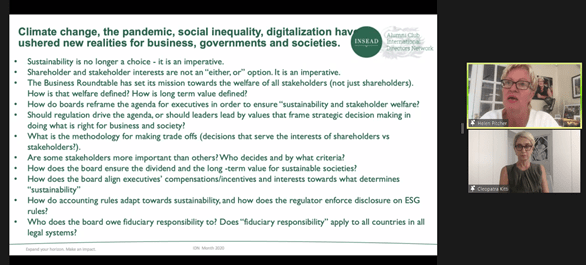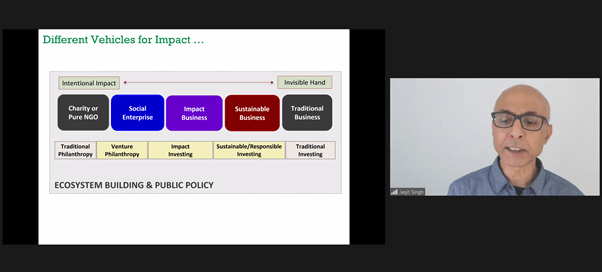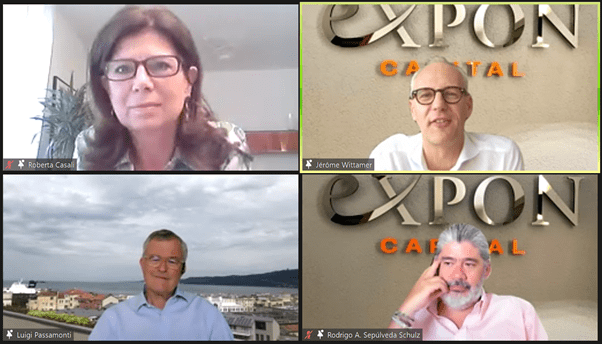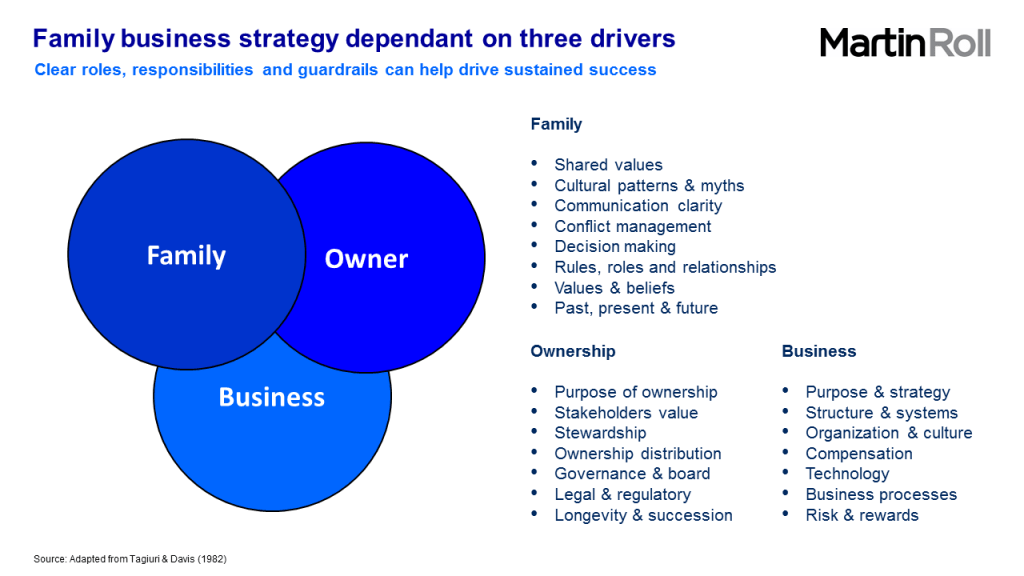In October 2021, INSEAD Directors Network (“IDN”) announced the three winners of the IDN Awards 2021.
The winner of IDN’s Good Governance Award, new in 2021 for excellence in governance, was Sadia Khan, Commissioner, Securities & Exchange Commission of Pakistan, MBA 1995, and IDP-C.

Sadia has pursued a versatile career path traversing investment banking, financial regulation, family businesses and entrepreneurship across three continents. In addition, she has been a passionate advocate of corporate governance for the past two decades. In 2018, she published The Corporate Governance Landscape of Pakistan, a historical anthology of work already accomplished under the realm of corporate governance as well as a reference book for future regulators, educators, and practitioners.
While at the ADB, Sadia helped implement corporate governance reforms in a number of member countries in South East Asia. As a senior member of the Securities & Exchange Commission of Pakistan, she was responsible for implementing the first Code of Corporate Governance in Pakistan. Since then, she has served as a member of various Task Force/Committees responsible for Revising the Code of Corporate Governance and introducing Guidelines for State Owned Enterprises.
As a corporate governance practitioner, she has served on various boards as an Independent Director. Sadia is also the immediate past global President of the INSEAD Alumni Association and has served as a member of many committees. In addition, she regularly contributes at international conferences and events as a speaker and panellist on issues ranging from multiculturalism to women entrepreneurs.
We recently asked Sadia for her views on several areas.
1. You have had an illustrious career, working in investment banking, financial regulation, family businesses and entrepreneurship across three continents. You have also written extensively about corporate governance, and you are a corporate governance practitioner. What led to your interest in corporate governance?
My corporate governance journey began over 25 years ago when I was working with the Asian Development Bank (ADB) in Manila. The Asian Financial Crises of 1997 brought into focus the important role of corporate governance in averting widespread crises in confidence in financial institutions and the corporate sector. As a result, all the program lending designed by the ADB for its member countries in the aftermath of this crises had a very important component of corporate governance.
Some years later, when I returned to Pakistan to take up a senior position with the Securities & Exchange Commission of Pakistan (SECP), the apex regulator of the Corporate sector, one of the first tasks given to me was to finalize and implement the first Code of Corporate Governance for Pakistan. This was done in 2002 and ever since then, I have been closely involved with the subsequent iterations of the code and its implementation as an educator, regulator and practitioner. I decided to document this in a book entitled “Corporate Governance Landscape of Pakistan” published by Oxford University press in 2017.
2. What lead to your interest in taking on independent director positions?
When I initially left public service in 2005, I was approached by many corporate entities in Pakistan to serve as an independent director on their board. They needed somebody familiar with corporate governance policies and practices to steer their companies towards better implementation. The reputation of independence and integrity that I carried from my previous positions enabled me to play a meaningful role and I was progressively approached by more and more corporates over time. For me, it was a great opportunity to get insights into diverse sectors of our economy as well as help implement corporate governance policies that I had helped design in the first place.
I was probably amongst the first Pakistani females to serve as an independent director of large listed companies, even before the provision of diversity was formally introduced in the country in 2017. Incidentally the last chapter of my book on corporate governance dealt with gender diversity on boards, and is seen by many as a precursor to the regulatory provisions introduced later the same year.
3. In your view, what are some of the key factors which leads to a company or organization exhibiting “good governance”?
In my opinion the “tone from the top” matters a lot and if the board itself and senior management attempts to implement sound corporate governance practices in letter and spirit, that itself helps to inculcate the necessary corporate culture towards compliance with best practices. Unfortunately, most adherence to regulatory provisions vis a vis corporate governance becomes a mere box ticking exercise for the compliance departments of the corporates.
Corporate governance centers around the board, and the board is as good as the people serving on it. Director selection is therefore of the utmost importance to ensure that they have the right level of knowledge, experience, integrity, and independence to make decisions in the interest of all stakeholders.
4. What are some of the areas which companies and their directors should focus on in the coming few years?
Apart from being knowledgeable about governance practices, Directors need to continuously educate themselves about emerging trends effecting the corporate sector and indeed the world around them. As such Sustainability or ESG issues need to feature prominently in all board discussions, whether in terms of the corporates own environmental footprint or in terms of its larger role as a member of the community in which it operates. Formalized policies and action plans for Diversity and Inclusion are needed if the companies are to attract and retain the best talent and achieve operational efficiency. Finally, Technology, the threats and opportunities emanating out of its pervasive and expanding use has to remain in focus in all board deliberations.
5. What is your advice to aspiring directors? What should they do to get themselves board-ready?
Most progressive jurisdictions have already recognized the need for diversity in board decision making to achieve optimum outcomes. Board directorships are therefore potentially available for a much broader spectrum of diverse skill sets than in the past. At the same time, much greater responsibilities have been placed on the board directors to play their role in the implementation of sound corporate governance practices as well as comply with the legal and regulatory frameworks within which the institutions operate. As such, those desirous of playing a role in the highest forum of decision making within these institutions need to prepare themselves by demonstrating the appropriate level of knowledge and skills as well as relevant experience to facilitate their induction. They have to take the initiative of obtaining the appropriate director training, build up their portfolios and make it part of their career aspirations, while utilizing the appropriate networking forums at their disposal. Once in a position to become change agents on any board, they have to make sure that decision making is in the hands of a diverse group of innovative minds that not only improves shareholder value, but makes this world a better place.
As told to Karen Loon, IDN Board Member











